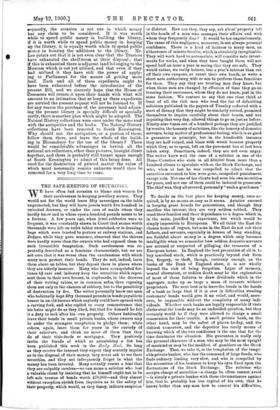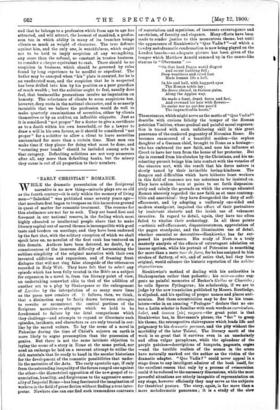THE SAFE-KEEPING OF SECUR1T11::
WE have often had occasion to blame rich women for their carelessness in keeping jewellery secure. They would not for the world leave fifty sovereigns on the table unprotected, but they will leave jewels worth five hundred in unlocked drawers, or under the care of maids whom they hardly know and in whose eyes a hundred pounds seems to be a fortune. A few years ago, when jewel robberies were so frequent, it was constantly shown in Court that stones worth thousands were left on toilet tables unwatched, or in dressing- bags which were trusted to porters at railway stations, and Judges, while 'they gave sentence, observed that the thieves were hardly worse than the owners who had exposed them to such irresistible temptation. Such carelessness was re- peatedly-described as a feminine characteristic, but we are not sure that it was worse than the carelessness with which many mtn protect their bonds. They do not, indeed, leave them about on tables, but they deposit them in places where they are utterly insecure. Many who have accumulated for- tunes by care and industry keep the securities Which repre- sent them in their own houses, in cupboards, in the drawers of their writing tables, or in common safes, thus exposing them not only to the chances of robbery, but to the possibility of destruction by fire. The writer personally knew one man who habitually kept fifty thousand pounds in bonds payable to bearer in an old bureau which anybody could have opened with a carving fork, and who replied to every remonstrance that his heirs might do as they liked, but that for himself he felt it a duty to look after his own property. Others habitually leave their bonds in small private banks, whose owners may be under the strongest temptation to pledge them; while others, again, leave them for years in the custody of their solicitors, and think no more of them than they do of their title-deeds or mortgages. They positively invite the frauds of which so astonishing a list has been published this week in the Daily Mad. So long as they receive the interest they expect they scarcely inquire as to the disposal of their money, they never ask to see their securities, and they not infrequently forget in what the money has been invested. Many actually resent a hint that they are culpably careless—we can name a solicitor who lost a valuable client by insisting that he himself ought not to be left sole trustee of bonds worth £70,000—and they almost without exception shrink from inquiries as to the safety of their property, which would, as they fancy, indicate suspicion or distrust. How can they, they say, ask about-property left in the hands of a man who manages their affairs and with whom they frequently dine ? It would be too ungentlemanly. The cause of this negligence, moreover, is not always personal confidence. There is a kind of laziness in many men, an abhorrence of minute trouble, which is absolutely inexplioable. They will work hard to accumulate, will consider safe invest- ments for weeks, and when they have bought them will not spend half-an-hour a year in seeing that they are safe. They would rather, we verily believe, lose a year's interest than cut off their own coupons, or count their own bonds, or write a short note authorising wife or son to perform those functions for them. They say they are trusting men they know, but when those men are changed by effiuxion of time they go on trusting their successors, whom they do not know, just in the same fashion. We venture to say that one clear third at least of all the rich men who read the list of defaulting solicitors published in the papers of Tuesday reflected with a start of dismay that they might be similarly robbed, promised themselves to inquire carefully about their bonds, and not inquiring that very day, allowed things to go on just as before. Ninety-nine times out of a hundred perhaps they are justified by results, the honesty of solicitors, like the honesty of domestic servants, being matter of professional feeling, which is as good a guarantee as principle, but in the hundredth instance they are half ruined, and blaze with wrath because property which they, so to speak, left on the pavement has at last been taken away. Sometimes, indeed, they are not even angry. The writer knew well the case of a solicitor in one of the Home Counties who stole in all £60,000 from more than a hundred clients to speculate with on the Stock Exchange, and who, when at last he was compelled to admit that the securities entrusted to him were gone, escaped all punishment except ruin. Not one of his clients had seen his own securities for years, and not one of them could be induced to prosecute. The thief was, they all averred, personally "such a gentleman."
To decide on the best place for keeping money, once ac- quired, is by no means so easy as it seems. Asiatics succeed in keeping great hoards for generations, and though they sacrifice the interest, they are very seldom robbed. They trust their families and their dependants to a degree which is, in the main, justified by experience, but which would be simply impossible to Europeans. We all think the East the chosen home of rogues, but sons in the East do not rob their fathers, and servants, especially in houses of long standing, are faithful about money to a degree which only becomes intelligible when we remember bow seldom domestic servants are accused or suspected of pillaging the treasures of a European house. In England the best precaution of all is to buy inscribed stock, which is practically beyond risk from fire, forgery, or theft, though, curiously enough, as the books of the Bank of England show, it is not wholly beyond the risk of being forgotten. Lapse of memory, mental aberration, or sudden death must be the explanation of most of those failures to draw dividends which in the aggregate make up so large a mass of treasure without proprietor's. The next beat is to leave the bonds in the hands of a bank so large that if it is ever in difficulties stealing customers' bonds would give it no relief, and would, more- over, be impossible without the complicity of many indi- viduals. Whether such banks are legally responsible if their clerks steal the bonds may be an undecided question, but they certainly would be if they were allowed to charge a small commission for their trouble. A small private bank, on the other hand, may be the safest of places to-day, and the riskiest to-morrow, and the depositor has rarely means of knowing which of the two conditions is the one that for the time dominates the situation. His guarantee is really only the personal character of a man who may be the most upright of mankind or may be the maddest of gamblers on the Stuck Exchange. That, we take it, is the temptation of the tempt- able private banker, who has the command of large funds, who finds ordinary lending very slow, and who is compelled by the necessities of his business to keep his eyes fixed upon the fluctuations of the Stock Exchange. The solicitor who accepts charge of securities—a charge he often cannot avoid —is simply a private banker with these circumstances against him, that he probably has less capital of his own, that he knows better than any man how to conceal his difficulties, and that he belongs to a profession which from age to age has attracted, and will attract, the keenest of mankind, a profes- sion too in which ability in many of its branches brings clients as much as weight of character. The true defence against him, and the only one, is watchfulness, which ought not to be held to imply suspicion of any wrongdoing, any more than the refusal, so constant in trustee business. to consider a cheque equivalent to cash. There should be no suspicion in business, which should be governed by rules found by long experience to be needful or expedient. The butler may be annoyed when " his " plate is counted, for he is an uneducated man, and the suspicion that he is suspected has been drilled into him by his position as a poor guardian of much wealth ; but the solicitor ought to feel, usually does feel, that businesslike precautions involve no imputation on honesty. The reluctance of clients to seem suspicions has, however, deep roots in the national character, and is so nearly incurable that we believe the profession would do well to make quarterly examinations of securities, either by clients themselves or by an auditor, an inflexible etiquette. Just as it is considered "not proper" for a doctor to give a certificate as to a death within his own household, or for a lawyer to draw a will in his own favour, so it should he considered "not proper" for a solicitor to allow a client to leave securities unexamined for more than a certain time. Most men can make time if they please for doing what must be done, and "counting your bonds" should be included among acts in that category. Defaulting solicitors are not very numerous after all, any more than defaulting banks, but the misery they cause is out of all proportion to their numbers.







































 Previous page
Previous page